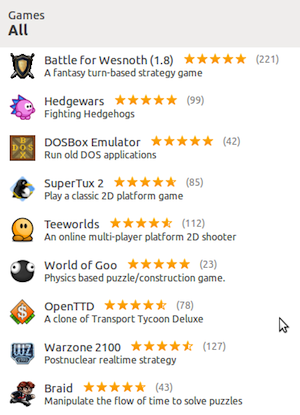Why Free Linux Games Won’t Cut It
 Richard Stallman of the Free Software Foundation recently mused on the topic of non-free games on Linux, and unsurprisingly he rejects them, even though admitting that they “might encourage users of the games to replace Windows with GNU/Linux”. His position has been consistent for decades. What’s important is teaching users about their freedom as software users, and making that a priority, and not so much increasing the Linux market share and mind share.
Richard Stallman of the Free Software Foundation recently mused on the topic of non-free games on Linux, and unsurprisingly he rejects them, even though admitting that they “might encourage users of the games to replace Windows with GNU/Linux”. His position has been consistent for decades. What’s important is teaching users about their freedom as software users, and making that a priority, and not so much increasing the Linux market share and mind share.
In reality, however, I believe freedom rests with choice, and not with terms of various license agreements. I’ve argued this before, and in light of such an argument my priorities would be quite different, as would those of many others who disagree with Stallman’s philosophy. Quite simply, the overall value of a platform depends on the number of people to whom it provides significant value. In other words, mind share and market share matter, and to achieve these you have to have an attractive platform. Needless to say, given how much of a draw gaming has been and continues to be for Windows, gaming on Linux matters.
There are plenty of free games for Linux, and some Linux advocates are quick to point to some of the better examples. Unfortunately, this selection of games just doesn’t cut it compared to what is commercially available, for a few reasons.
Relatively Poor Quality
When you still see the likes of TORCS and OpenArena highlighted among the top of the crop of the free Linux games offering you have to know something’s wrong. Just compare TORCS with GRID or latest Need For Speed, and it will be obvious. And note that OpenArena is a clone of Quake III Arena, a game that was all the rage 12 years ago.
Most of the rest of the typically highlighted titles don’t fare a lot better. The overall impression I get is that free Linux gaming generally lags at least half a decade behind the rest of the industry. It seems fitting to say that you really do get what you pay for, and it’s hard to expect anything better on that kind of budget.
You only need to peruse the Steam library of games to see what you’ve been missing if you’ve been living in a free Linux gaming bubble (like I once did).
Lack of Variety
In almost any given game genre chances are your choices will be rather limited. Even in the genre of First Person Shooters, which appears to be the most popular on Linux (and most of which was based on commercially developed and then freed old engines by ID), just about all you will find are arena-style multiplayer shooters. There’s typically no story driven single player mode. In other genres you are likely to get only a few choices, and most of them may seem half assed compared to the commercial competition.
Poor Recognizability
Most of these free Linux games have very little to no established branding, that is, most people won’t recognize them or be explicitly looking for them. People mostly find out about them when looking for “free Linux games”, not for any specific game. Compare that to the fame of Call of Duty, Deus Ex, Mass Effect, Portal, Need For Speed, RUSE, and so on. What this means is that gaming pretty much doesn’t play any significant role at all in drawing people to Linux, because there are no high profile games associated with Linux, and these free ones don’t appear to be getting through into this high profile group.
Conclusion
In the end Richard Stallman refers to the Liberated Pixel Cup, and the LibrePlanet Gaming Collective. One would produce a game with only limited niche appeal, and the other is just a wiki page about a group of activists enthusiastic about gaming, whose only activity so far appear to be the LAN parties. I’m not terribly inspired by this, and in fact it seems obvious he’s rather out of touch with the modern gaming world.
As things stand right now free Linux games provide only a crutch for Linux gaming, a little something to brag about in defending the case that Linux gaming is a thing, that it is alive. However, that is a far cry from what the competition offers. If the Linux gaming strategy continues to center on free games then I don’t think its future is gonna be much better than the present.
This is why the idea of having Steam on Linux, with a considerable amount of commercial games available, to be something worth supporting, especially if it makes getting and installing such games on Linux easier than it currently is. It can make the platform more valuable to a greater number of people, and that’s all that makes anything really matter in the end.


Comments - 23 Responses to “Why Free Linux Games Won’t Cut It”
Sorry but comments are closed at this time.